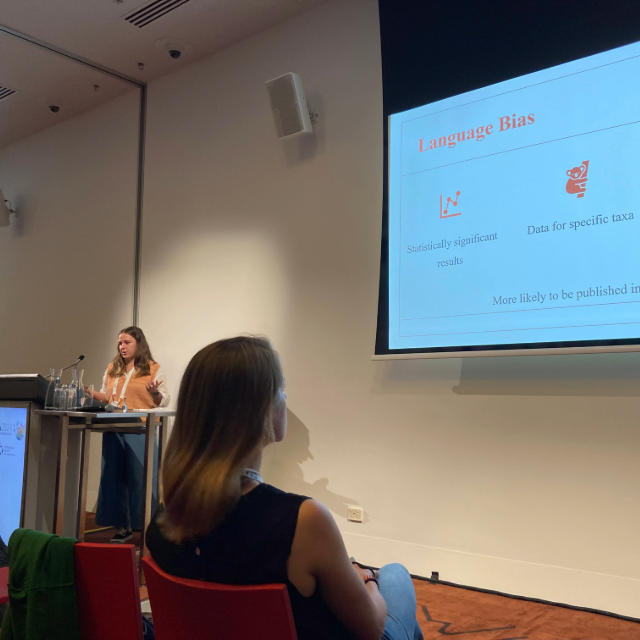I had the privilege of attending the Ecological Society of Australia (ESA) conference held in Melbourne in December 2024. Being in the final year of my PhD, this conference was a significant opportunity to build connections and share my research with peers and leading experts in the field of conservation science. The experience became even more memorable when I was honoured with the Society for Conservation Biology (SCB) Student Prize for Best Spoken Presentation on Conservation Biology.
Inaugural winner
The SCB is a global organisation dedicated to advancing the science and practice of conserving the Earth’s biodiversity. This award was one of several prizes presented at the conference, with 21 awards granted to students alone this year. ESA2024 also marked the inaugural presentation of this specific award. To be chosen from hundreds of student presenters amid such fierce competition was deeply humbling.
My presentation, titled Understanding the flow of information and evidence in multilingual conservation citations, delves into a critical yet often overlooked challenge in conservation science: the underutilisation of non-English language evidence. Conservation decisions depend on the best available scientific evidence, yet much of this evidence exists in languages other than English and is rarely incorporated into global conservation frameworks. My research aimed to uncover patterns of citation and evidence flow across 15 non-English languages and their interaction with English-language publications.

Image: supplied
Tangible steps, practical measures
The findings revealed significant disparities. Non-English-language articles were cited far less frequently in the English-language literature than their English counterparts, despite their high citation rates within their respective languages.
Languages such as Hungarian, Polish, Korean and Russian emerged as being particularly under-cited in the English literature. Interestingly, articles with translated English abstracts were more likely to receive English citations, highlighting a tangible step that can be taken to increase the accessibility and visibility of non-English evidence. Surprisingly, other factors like study design rigour or a focus on threatened species had no significant impact on citation rates in English, further underscoring the dominance of linguistic barriers.
These results demonstrate the need to bridge language gaps to build a more inclusive and comprehensive understanding of global conservation challenges. Conservation issues are inherently global, and excluding evidence from non-English sources risks creating biased or incomplete solutions. My research advocates for practical measures, such as promoting the inclusion of English abstracts in non-English articles and fostering collaborations that amplify non-English contributions to conservation science.

Image: supplied
Building awareness of language barriers
The ESA 2024 conference provided a platform to present this work, engage in thought-provoking discussions and gain insights from a diverse array of research spanning ecology, conservation, environmental and interdisciplinary science. Winning the SCB award was not only a personal milestone but also an affirmation of the importance of addressing language barriers in conservation.
I would like to extend my heartfelt congratulations to my fellow CBCS students who attended the conference and delivered outstanding presentations throughout. I am also deeply grateful to my supervisors, Associate Professor Tatsuya Amano and Professor Richard Fuller, for their invaluable guidance and support throughout my research journey. Additionally, I wish to acknowledge the School of the Environment for providing the funding that made it possible for me to attend this conference.
For me, this award is a testament to the growing awareness of the challenges my research addresses. Language barriers in conservation are not just an academic issue but also a practical one that affects how effectively we can protect species and ecosystems worldwide. The support and recognition from the SCB and the broader ESA community motivate me to continue this line of research and advocate for more inclusive scientific practices.
Finally, I am excited to share that the paper stemming from this research has been accepted for publication in Conservation Biology, and is expected to be published shortly. I hope it will contribute to the ongoing discourse on understanding language divisions and making conservation science more equitable.
Attending ESA2024 and receiving this award has been a highlight of my academic journey, and I am deeply grateful for the opportunity to share my work on such an important stage. As I near the completion of my PhD, I look forward to building on these insights and continuing to explore and overcome the barriers that exist within the field of conservation science.
To keep up to date on our latest events, check out our Bluesky and LinkedIn.
